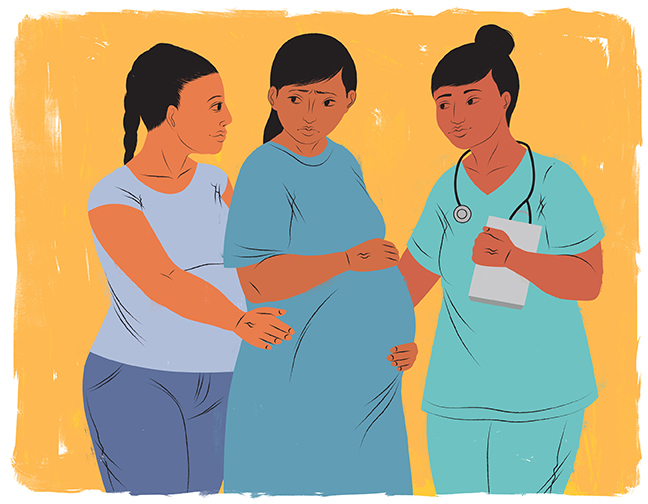Women's Health
- Women's Health Home
- Maternal Care Access
- Dignity in Pregnancy and Childbirth Act
- Task Force on Pregnancy Health and Substance Use Disorders
- Innovations for Maternal Health Outcomes in Minnesota (I-MOM)
- Comprehensive Drug Overdose Response
- Minnesota Innovations in Perinatal and Infant Health
Programs of Interest
Doulas in Minnesota: Information for Families

A doula is someone who supports you during your pregnancy, birth, and after your baby is born. They are not a medical professional and do not replace the care provided by a midwife or doctor. There are many benefits from having a doula, including emotional, physical, and educational support for you and your family. A doula will also be an important advocate for you and help you identify and reach specific goals for your birth.
A doula is beneficial no matter what kind of birth you plan to have. They support births across the spectrum including medicated births, unmedicated births, inductions, C-sections, prenatal/postpartum, and in all kinds of settings (hospital, birth center, home).
Why should you have a doula?
Research has demonstrated that having the support of a doula can provide benefits such as:
- Less likely to have a cesarean (C-section) birth.
- Can reduce the length of labor.
- Provide non-medical pain relief techniques.
- Reduce stress and anxiety.
- Support the partner/spouse.
- Babies often have higher scores in important factors such as heart rate and respiration at birth.
The support of a doula is especially important for people who face inequities and disparities in maternal and child health outcomes. This includes persons who identify as Black, Indigenous, BIPOC, low income, LGBTQ2-S+, or living in a rural area. Research shows that a doula can help birthing people/families from these groups feel safer, more empowered to make decisions about their body and baby, and more connected socially.
More information:
- Evidence Based Births - Evidence on: Doulas
- American Pregnancy Association - Having a Doula – What are the Benefits?
- Advancing Birth Justice: Community-Based Doula Models as a Standard of Care for Ending Racial Disparities (PDF)
How do I find a doula?
When looking for a doula, consider any characteristics or experience that are important to you. This might include training in certain birthing techniques, experience with twin pregnancies, or lived experience that is similar to yours.
Many people choose to contact multiple doulas and set up a time to meet them. There are several question guides available online, including:
- Fourth Trimester - Doula Interview Questions
- Lamaze International - All the Doula Interview Questions You Need to Ask (and Then Some...)